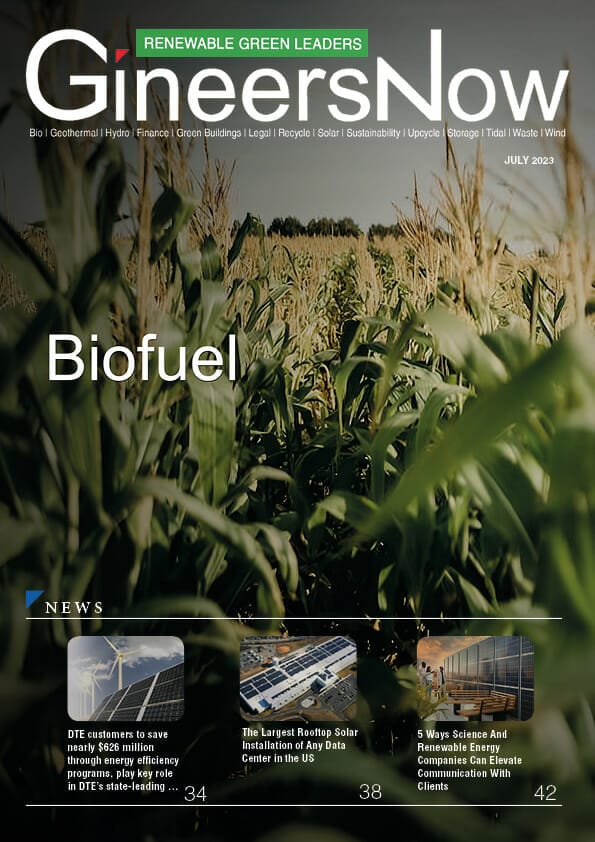As the world continues to grapple with the challenges of climate change and environmental degradation, renewable energy sources have become increasingly important. Biofuel, derived from organic matter such as plants and waste, is one such source that has gained significant attention in recent years. With their ability to reduce greenhouse gas emissions and dependence on fossil fuels, biofuels hold great promise for a sustainable and cleaner future.
In this article, we’ll explore what biofuels are, how they work, and why they’re crucial for our planet’s health. We’ll delve into the different types of biofuels available today, including ethanol and biodiesel, as well as emerging technologies like algae-based fuels.
The need for sustainable and clean energy
The world’s energy consumption has been continuously increasing, and it is becoming more critical to shift toward sustainable and clean sources of energy. Biofuel is one alternative that can significantly reduce greenhouse gas emissions and dependence on fossil fuels. Biofuels are produced from renewable resources like plant matter, corn, soybeans, vegetable oils, animal fats, or waste materials.
Biofuels have a lot of potential as a sustainable energy source since they are considered carbon-neutral. This means that the carbon dioxide released during their combustion cycle is equal to the amount absorbed by the plants during their growth phase. Biofuels also have a significant advantage over fossil fuels regarding availability since they can be produced locally with minimal environmental impact. Moreover, biofuel production can create new jobs in rural areas where traditional agriculture practices may not be profitable anymore.

What is Biofuel?
Biofuel is a type of fuel that is made from organic matter, such as plants or animal waste. It is a renewable energy source that can be used to replace traditional fossil fuels like oil or coal. Biofuels are considered to be more environmentally friendly than fossil fuels because they produce fewer emissions when burned.
There are two main types of biofuel: ethanol and biodiesel. Ethanol is typically made from corn or sugarcane, while biodiesel is often made from vegetable oils like soybean oil or canola oil. Both types of biofuel can be used in vehicles and machinery in place of traditional gasoline or diesel.
Biofuels have become increasingly popular in recent years as people look for ways to reduce their carbon footprint and move towards more sustainable forms of energy.
How Does Biofuel Work?
Biofuel is a type of fuel that is derived from organic matter, such as crops, agricultural waste, and even animal fat. It is an alternative to traditional fossil fuels such as oil and gas, which are finite resources that can have harmful environmental impacts. Biofuels can be used in a variety of applications, including transportation and electricity generation.
The production process for biofuels typically involves breaking down the organic matter into simple sugars or other components that can be fermented or converted into usable fuel. The resulting biofuel can then be blended with traditional petroleum-based fuels or used on its own. Some types of biofuels include biodiesel, which is made from vegetable oils or animal fats; ethanol, which is made from corn or other crops; and biogas, which is produced through the breakdown of organic matter in landfills or wastewater treatment plants.

Definition and Types of Biofuels
Biofuels are a type of fuel that is derived from biological materials such as plants and animals. They are considered to be an alternative to traditional fossil fuels such as oil and gas, which are finite resources with a significant impact on the environment. Biofuels have gained popularity in recent years due to their potential for reducing greenhouse gas emissions and dependence on foreign oil.
There are two main types of biofuels: first-generation and second-generation. First-generation biofuels are produced from edible crops such as corn, sugarcane, and soybeans using conventional methods such as fermentation. These biofuels have been criticized for being unsustainable because they compete with food production for land use, leading to higher food prices and environmental degradation.
Benefits of Using Biofuel
Biofuels are an excellent alternative to traditional fossil fuels, and their use has gained momentum in recent years. Derived from organic matter such as crops, wood chips, and animal waste, biofuels offer a number of benefits over their non-renewable counterparts. Apart from being eco-friendly, they are renewable and can be produced locally.
One of the primary benefits of using biofuel is that it reduces greenhouse gas emissions. When burned, biofuels release significantly lower amounts of carbon dioxide than fossil fuels. This not only helps to combat climate change but also improves air quality by reducing harmful particulate matter in the atmosphere. Additionally, since biofuels are produced from organic materials that absorb carbon dioxide during growth or production, they help mitigate the negative effects of deforestation.
Another key benefit of using biofuel is energy security. Canada is the world’s second-largest producer of biodiesel, and growing domestic production will help to reduce our reliance on crude oil imports from other countries.

Environmental and Economical Advantages
Biofuel is a renewable form of energy that has become increasingly popular in recent years. The use of biofuels as an alternative to fossil fuels offers numerous environmental and economic advantages. One of the biggest benefits of biofuels is that they are cleaner burning than traditional fossil fuels, which means they produce fewer harmful emissions.
Another major advantage of using biofuels is that they are often less expensive than oil-based fuels. This can be particularly beneficial for countries that rely heavily on imported oil, as it reduces their dependence on foreign sources of energy. In addition, many governments offer tax incentives and subsidies for businesses and consumers who choose to use biofuels over traditional fossil fuels.
In conclusion, the use of biofuels provides significant environmental and economic advantages compared to traditional fossil fuels.
Challenges in the Production and Use of Biofuel
Biofuels are considered an important alternative to fossil fuels, but their production and use come with several challenges. One of the most significant challenges is the high cost of producing biofuels compared to traditional fuels. The production process requires large amounts of energy and resources, including water, land, and fertilizers, which can drive up costs significantly.
Another challenge in the production of biofuels is their impact on food security. Many biofuels are produced from crops such as corn or soybeans that could otherwise be used for food production. This can lead to increased competition for land and resources between fuel producers and food producers, resulting in higher prices for both commodities. Additionally, some studies have suggested that using food crops for fuel production could exacerbate hunger issues in developing countries by reducing available food supplies.
Despite these challenges, there are potential solutions on the horizon.
Land-use Competition, Food Security, and Scalability Issues
Land-use competition has emerged as a critical issue that is threatening food security and scalability. The increasing demand for biofuel production is putting pressure on land resources, leading to competition between food crops and fuel crops. This situation is likely to intensify in the coming years as governments across the world strive to meet their energy needs while also reducing greenhouse gas emissions.
Biofuel production has become an attractive option for countries seeking alternative sources of energy. However, this development presents challenges in terms of land use for agriculture. Competing demands for land resources will affect food security since agricultural lands are being repurposed for biofuel production, potentially reducing the availability of arable land for growing crops that can be used to feed people. This situation calls for careful planning by policymakers to balance energy security with food security concerns.
Innovations in Biofuel Production
Biofuels have emerged as a promising alternative to traditional fossil fuels. These biofuels are derived from organic matter such as plants, algae, and even waste, thereby reducing dependence on non-renewable sources of energy. However, the production of biofuels has been limited due to high costs and complex processes. Innovations in biofuel production are, therefore, crucial for increasing their affordability and sustainability.
One major innovation in biofuel production is the use of genetically modified organisms (GMOs) to enhance the efficiency of converting biomass into fuel. Scientists have engineered microbes that can break down cellulose more effectively and produce higher yields of ethanol or other biofuels. Similarly, researchers have discovered new enzymes that can accelerate the breakdown process without requiring costly pretreatments. Another breakthrough is the development of advanced fermentation techniques that employ synthetic biology to optimize metabolic pathways for maximum output.
Advanced Technologies for More Efficient and Eco-Friendly Processes
Advanced technologies are paving the way for more efficient and eco-friendly processes across various industries, including biofuel production. The use of sustainable sources of energy is an essential aspect of reducing carbon emissions and mitigating climate change. Biofuels, which are derived from renewable resources such as crops, waste products, and algae, have gained traction in recent years as a cleaner alternative to fossil fuels. However, their production requires energy-intensive processes that can result in significant environmental impacts.
To address these challenges, advanced technologies are being developed to make biofuel production more efficient and sustainable. For instance, researchers are exploring new methods for converting biomass into fuel that require less water and energy than traditional approaches. They are also investigating ways to improve the yields of biofuels by optimizing the growth conditions for feedstocks such as algae or enhancing the efficiency of conversion technologies like pyrolysis or gasification.
The Future of Biofuel
Biofuel is a renewable energy source that has the potential to revolutionize the way we power our world. Made from organic materials like agricultural crops, industrial waste, and even algae, biofuels offer several advantages over traditional fossil fuels. Not only do they produce fewer greenhouse gas emissions, but they are also more sustainable and can be produced domestically.
The future of biofuel looks promising as advancements in technology continue to make it a more viable option for powering everything from cars to airplanes. One key area of development is the use of non-food crops like switchgrass or algae, which could increase production efficiency while minimizing land use. Additionally, scientists are exploring ways to optimize biofuel production by creating genetically modified organisms that can efficiently convert biomass into fuel.
Another exciting prospect for the future of biofuels is their integration with other renewable energy sources like wind and solar power.
Potential for a Greener Energy Landscape
The world is rapidly changing, and so is our energy landscape. With the rising concerns of climate change and environmental degradation, there has been a growing need for renewable energy sources that can replace fossil fuels. Among them, biofuels have emerged as one of the most promising alternatives to traditional oil-based fuels.
Biofuels are derived from organic matter, such as plants or algae. They have numerous advantages over conventional fossil fuels, including lower carbon emissions and reduced dependence on non-renewable resources. Biofuel production also provides economic benefits to farmers who grow the crops used for fuel production.
However, there are still challenges associated with biofuel production, such as land use competition between food crops and fuel crops, water scarcity in some regions, and concerns about sustainability.
Read GineersNow Renewable and Green Magazine for FREE
Takeaway: Embracing the Potential of Biofuel
In conclusion, biofuel has emerged as a promising alternative to traditional fossil fuels. Its use not only helps us reduce our dependency on non-renewable sources of energy but also mitigates the impact of greenhouse gas emissions on our environment. While there are still challenges that need to be addressed, such as sustainable production methods and cost-effectiveness, these issues can be overcome with continued research and development. It is time for us to embrace biofuels as a key component in our efforts toward a sustainable and cleaner environment. Let us all work together to promote the adoption of biofuels and secure a better future for ourselves and generations to come.

Editor’s Note: Biofuel for a Sustainable and Cleaner Environment
Biofuel is a renewable energy source that has gained increasing attention in recent years due to its potential to reduce greenhouse gas emissions and reliance on non-renewable fossil fuels. Biofuels are derived from organic matter, such as crops, waste products, or algae, which can be converted into liquid fuel for transportation and heating purposes. The use of biofuels has been viewed as a sustainable alternative to traditional gasoline and diesel because it emits fewer pollutants and reduces dependence on foreign oil imports.
As the world faces growing environmental concerns and climate change challenges, biofuels have emerged as one of the key solutions to achieve a cleaner and more sustainable future.
Biofuel is a promising solution to reduce greenhouse gas emissions and achieve a sustainable and cleaner environment. With the advancement in technology, the production of biofuels has become more efficient and cost-effective. By shifting towards renewable energy sources like biofuel, we can reduce our dependence on fossil fuels and mitigate climate change. Governments, industries, and individuals should take steps to promote the development and use of biofuels. Investing in research, implementing policies, and raising awareness about the benefits of biofuels can go a long way in building a greener future for generations to come. Let us embrace this opportunity to make a positive impact on our planet and create a healthier world for all living beings.








